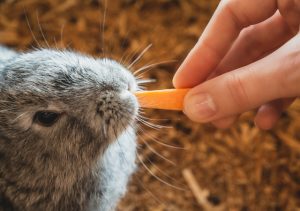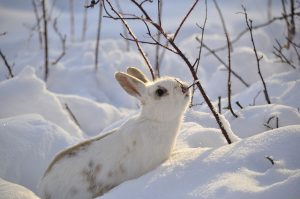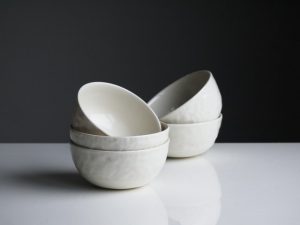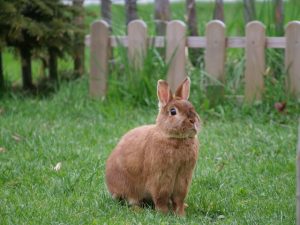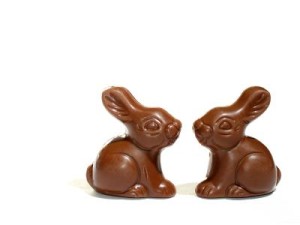
Rabbits as house pets are not low maintenance. They need to live only indoors. They also need your time and attention for different fun exercises. You need to be there to change his litter box, his water bottle/bowl, to clean his cage, to offer him only fresh vegetables. For all his activities, the recommended size for the living space is at least 12 square feet according to the Animal Welfare Act. You cannot just leave them a stash of hay and water for the day and they should be alright.
When taking care of rabbits as pets, it is important to note that what we eat as humans are not necessarily good for them. We may eat onions in our meals, but that is not to say that rabbits will eat them too if you feed it to them. In fact, there are food items that we humans eat that are not safe at all for your pet rabbit. The same way that we do not eat hay for lunch, it is important that we keep our rabbits away from food that can be detrimental to their health.
Can I Give My Rabbit Chocolate?
No. A bolded NO.
Rabbits are lagomorphs. As lagomorphs, it means that their digestive systems can only process food items high in cellulose such as hay, leaves, and vegetables. Giving them chocolate can upset their digestive system, and when that happens, it can be both uncomfortable for you and your pet rabbit. At the end of the day, an upset stomach is the last thing that you can give to your pet rabbit.
A rabbit’s digestive system cannot process the complex components of chocolate namely ground cocoa, huge amounts of sugar and loads of artificial enhancers and flavorings. When they do eat chocolates, there is a tendency for them to develop a runny stool or diarrhea. Not only is it uncomfortable for the pet rabbit and the owner, but some rabbits die when this does not get detected immediately by their owners. Even if you are considering giving your pet rabbit a tiny piece of chocolate as an afternoon treat, the repercussions of a minuscule piece of cocoa can be significantly big. On the off chance that your pet rabbit accidentally ate a few pieces of chocolate, make sure to have him or her drink water and bring him or her to the vet for sound medical advice. Caution and immediate medical care are best at this time.
With all the arguments said about chocolates, we can now establish that chocolates are poisonous to rabbits. Even dogs and cats can die from an overdose of cocoa if their owners are not watching. Given rabbits' strict vegetarian diets, anything that is off-tangent to their vegetarian diet can be poisonous. Aside from chocolates, onions and raisins are also found to be poisonous for pet rabbits. Aloe vera, coffee beans, millet sprouts and bamboo shoots can be poisonous too for them. Moreover, since most chocolates that we see in the market today are made of soy or are manufactured in machines used to process peanuts, the components of everyday chocolate can be truly harmful to pet rabbits. If you are the kind of homeowner who loves munching on a chocolate bar, reserve all the pieces to yourself and never attempt feeding a tiny piece of it to your pet rabbit. When methylxanthines in chocolates (and even caffeine) are ingested by pet rabbits, diarrhea as well as seizures, excessive thirst and urination and even early death can happen.
Now that chocolate is out of the question, the components of your pet rabbit’s daily diet should always consist of hay, green leafy vegetables, and water. Hay can be of two kinds namely legume hay and grass hay. Legume hay usually consists of clover and alfalfa grass. It is high in calories, calcium, and phosphorus. Grass hay, on the other hand, usually consists of a combination of Bermuda grass, Timothy, and orchard grass. While it contains significantly fewer calories, calcium, and phosphorus, grass hay has more fiber content. If your pet rabbit is young and looks too small or thin for his or her age, give them a stash of legume hay to help them gain weight through the extra calories. If you happen to notice that your pet rabbit is getting chubbier and heavier by the day, resort to grass hay for the extra fiber.
When shopping for hay, select the one that is green and has a clean smell. Avoid hay that has too many dust, dirt or even weeds on them. Remove any hay stalks that are yellowing a little and make sure that the hay you buy does not have any molds on it. The same level of screening should be done too when selecting your pet rabbit's supply of green leafy vegetables.
Buy green leafy vegetables such as Broccoli flowers and stem, spring greens, dark green lettuce, endive, Brussels sprouts, cabbage to name a few, especially because of their low Calcium content. Twice a week, because of their oxalic acid content, you can also try parsley, spinach, mustard greens, beet greens, or radish tops. Also twice a week, because of their high Calcium content, Parsley, Kale, Dandelion greens, Turnip greens, Collards, or Mustard spinach. Read more about the right vegetables for rabbits and how often or how sparingly you should feed them.


